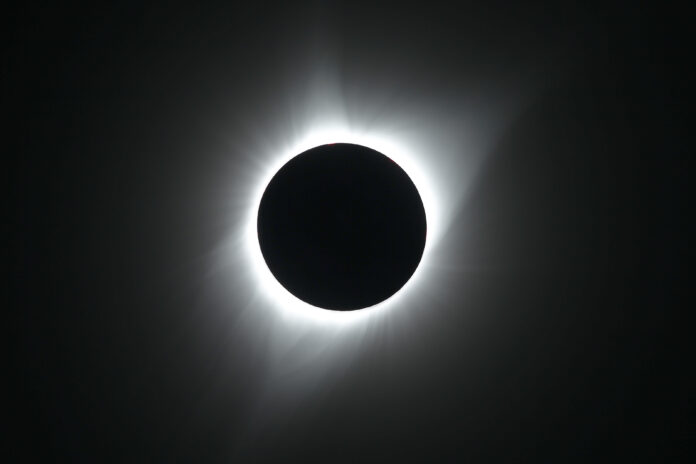The Supreme Court of New York has issued a warning about impacts caused by the solar eclipse in a few weeks in an example of how the event may affect the everyday lives of people who live and work in the path of totality.
On April 8, the moon will be positioned so that the entire disc of the sun will be blocked in several U.S. states, plunging millions of people into darkness during the early afternoon.
The spectacle is expected to draw crowds from around the nation as people head to areas in the path of totality to witness the eclipse. Officials across the nation have voiced concerns about stretched public safety resources, an “enormous strain” on local hospitals and congested roadways.
At least four states have urged residents to stock up on groceries and gas in the days leading up to the eclipse, as traffic is expected to overwhelm local roads.
Some cities are expecting their population to triple for the event, and many schools—including colleges—within the path of totality plan to cancel classes, citing student safety.
The path of totality will start in Mexico and extend across Texas, Oklahoma, Arkansas, Missouri, Illinois, Indiana, Ohio, New York, Pennsylvania, Vermont, New Hampshire and Maine before heading over the North Atlantic.
Getty
At 10 a.m. local time on the day of the eclipse, the Appellate Division: Fourth Judicial Department is expected to convene for oral arguments at the M. Dolores Denman Courthouse in Rochester, New York. The clashing events prompted the court to warn attending parties to expect traffic delays.
“Concurrently, a solar eclipse event is anticipated to commence at 2:07 p.m. local time. With Rochester being a focal point for observing this celestial phenomenon, heightened travel congestion is expected on roadways, and parking options will be limited throughout the day, potentially affecting those commuting to the court,” the warning said.
“Parties who have opted for in-person argument are strongly encouraged to arrive early to account for potential delays. Alternatively, these parties have until the close of business on Wednesday, April 3, to elect to argue remotely, should they find it more feasible.
“It is imperative to emphasize that parties who are not present when their case is called will be deemed submitted in accordance with court rules.”
Newsweek has reached out to the Supreme Court of New York by email for comment.
In addition to plunging those in the path of totality into darkness, the solar eclipse has the capacity to change the weather. Temperatures could drop, cloud cover could decrease, and relative humidity could increase.
Although only a handful of states will be in the path of totality, every state in the contiguous U.S. will be able to see some form of eclipse, with only small parts of Hawaii and Alaska missing out.
The last total solar eclipse in the U.S. was on August 21, 2017. The next one will not occur in North America until 2044.
Uncommon Knowledge
Newsweek is committed to challenging conventional wisdom and finding connections in the search for common ground.
Newsweek is committed to challenging conventional wisdom and finding connections in the search for common ground.


